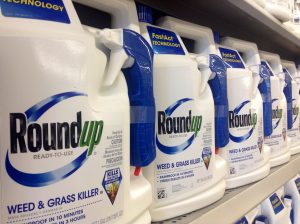17
Apr
Canadian Food Inspection Agency Finds Residues of Glyphosate in One-Third of Food Products Tested
(Beyond Pesticides, April 17, 2017) The Canadian Food Inspection Agency (CFIA) published a report on glyphosate testing last week, finding traces of the chemical in about one-third of food products and residue levels above the acceptable limits in almost four percent of grain products. These findings come on the heels of the U.S. Department of Agriculture’s (USDA) decision to abandon plans for testing the U.S. food supply for glyphosate residues. In light of this, Beyond Pesticides is again urging USDA to test for glyphosate residues in U.S. food.
 According to the CFIA report: “In 2015-2016, 3188 samples of domestic and imported food products were collected and tested for glyphosate residues in three programs:
According to the CFIA report: “In 2015-2016, 3188 samples of domestic and imported food products were collected and tested for glyphosate residues in three programs:
- Testing of 482 samples of fresh and processed fruits and vegetables as part of the National Chemical Residue Monitoring Program (NCRMP);
- Retail survey of 2497 samples of grains (barley, buckwheat, and quinoa), beverages, bean, pea, lentil, chickpea and soy products;
- A survey of over 209 retail samples of infant foods as part of the 2015-2016 Children’s Food Project.”
Out of the 3,188 products tested, glyphosate residues are detected in 29.7% of samples. The highest number of samples with residues detected occur in bean, pea and lentil products, at 47.4%. Of those bean, pea, and lentil samples, 0.6% have residues higher than allowed by Health Canada’s Maximum Residue Limit (MRL). The second highest number of samples found to have glyphosate residues occur in grain products, at 36.6%. Out of those grain samples, 3.9% have residues higher than allowed by the MRL. Even though samples are found that exceed the MRL, Health Canada has determined that none pose a health or safety risk. Many scientists, environmentalists, and concerned citizens disagree, pointing to the extensive science demonstrating the harm of glyphosate exposure, even at low levels.
Glyphosate became a focus of media attention following the 2015 World Health Organization’s (WHO) International Agency for Research on Cancer (IARC) classification of glyphosate as a “probable human carcinogen.” In addition to IARC’s findings, previous studies have linked the toxicant to non-Hodgkin’s lymphoma and multiple myeloma. One study finds that chronic, low-dose exposure to glyphosate leads to adverse effects to liver and kidney health. Roundup formulations can also induce a dose-dependent formation of DNA adducts (altered forms of DNA linked to chemical exposure, playing a key role in chemical carcinogenesis) in the kidneys and liver of mice. Human cell endocrine disruption on the androgen receptor, inhibition of transcriptional activities on estrogen receptors on HepG2, DNA damage and cytotoxic effects occurring at concentrations well below “acceptable” residues have all been observed.
Even more concerning is the fact that Monsanto, the producer of Roundup (glyphosate), may have colluded with the Environmental Protection Agency (EPA) to fight the IARC cancer classification for glyphosate. According to the New York Times, unsealed court documents “include Monsanto’s internal emails and email traffic between the company and federal regulators [and] suggested that Monsanto had ghostwritten research that was later attributed to academics.” Monsanto has made several other efforts to muddle the science showing glyphosate causes harm.
While federal oversight and regulation lags behind, environmental groups, like Beyond Pesticides, are urging localities to restrict or ban the use of glyphosate and other unnecessary toxic pesticides. Beyond Pesticides promotes these actions and many more through the Tools for Change webpage. This page is designed to help activists and other concerned citizens organize around a variety of pesticide issues on the local, state, and national level. Learn how to organize a campaign and talk to your neighbors about pesticides with our factsheets.
Consumers can also avoid glyphosate exposure by buying and supporting organic food and agriculture. Beyond Pesticides has long promoted the importance of organic in a sustainable food system, and works to promote the widespread transition of conventional farmland to organic production. Utilizing ecological pest management strategies, organic practices, and solutions that are not chemical-intensive is the most appropriate and long-term solution to managing unwanted plants, or weeds. To find out more about the work Beyond Pesticides is doing on organic integrity and actions you can take, check out Keeping Organic Strong, or to see all the reasons to go organic, visit Eating with a Conscience.
Source: Safeguarding with Science: Glyphosate Testing in 2015-2016; CBC News
All unattributed positions and opinions in this piece are those of Beyond Pesticides.










